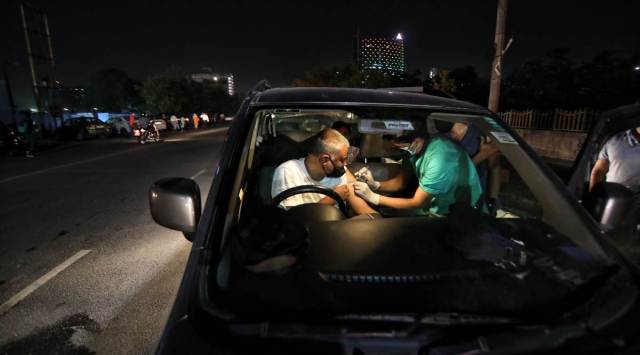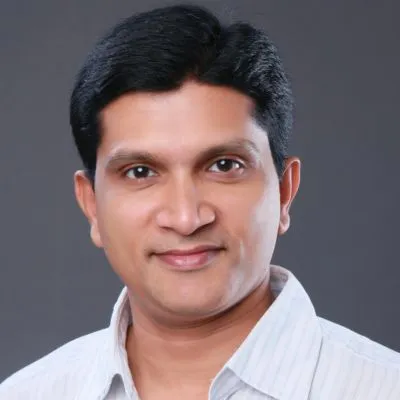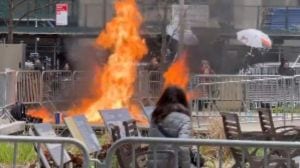- India
- International
Supreme Court tells Government: Wake up and smell the coffee, let vaccine policy be flexible
The Centre, in reply, said that it is not oblivious to ground realities and since this is a dynamic situation, no policy is cast in stone. It also said it hopes to vaccinate all eligible persons by the end of 2021.
 Drive-through vaccination in Noida’s Sector 137 on Monday. (Express photo by Abhinav Saha)
Drive-through vaccination in Noida’s Sector 137 on Monday. (Express photo by Abhinav Saha)Wondering if the mandatory registration requirement on the CoWIN portal for people to access COVID-19 vaccines is practical given the digital divide in the country, the Supreme Court Monday asked the government to “wake up and smell the coffee” and ensure that its vaccine policy is flexible enough to accommodate changes to address concerns.
The Centre, in reply, said that it is not oblivious to ground realities and since this is a dynamic situation, no policy is cast in stone. It also said it hopes to vaccinate all eligible persons by the end of 2021.
Hearing a suo motu matter on issues relating to COVID-19 management, Justice DY Chandrachud, heading a bench that also comprised Justices L Nageswara Rao and S Ravindra Bhat, asked Solicitor General Tushar Mehta: “Even in the villages, they have to get registered at a common centre. Is this practical? Policy makers must keep an ear to the ground. Look at the poor agricultural labourer from Jharkhand who went to Rajasthan. He has to go to a centre there?… You can certainly have registration, but how will you answer the digital divide? How do you answer the question about migrant labourers who have to go from one State to another?”.
These remarks came when Mehta, referring to an affidavit filed by the Centre in the matter, said one does not have to do registration on the CoWIN portal individually and can take the help of Common Service Centres that provide access to Internet in panchayats or of friends or relatives who can do bulk registration. “The Executive, whose intentions are not in doubt, have taken this (decision),” he said.
Responding, Justice Chandrachud said: “We are not changing the policy. If we had to do it, we would have done it 15 days ago (apparently referring to the last hearing). We are asking you to please wake up and smell the coffee and see what’s happening across the country.”

Mehta said the online registration decision has been taken since vaccines are not unlimited and if walk-in is allowed there will be crowding. Walk-in is now allowed, subject to availability of vaccines. He said owing to the constraint of human and infrastructural resources, it was considered prudent not to permit walk-in registration. “Now 45-plus people are less and, hence, there is less crowding now,” he said.
The bench said: “We are not going to say that we have a better policy in mind. There is an April 30 order pointing out flaws. Policymakers must have some flexibility. Our arms are strong enough to come down if we see there is non-compliance.”
Justice Chandrachud said “digital literacy in India is still far from perfect. I am the chairperson of the Supreme Court e-committee and I have seen the problems which afflict this. You have to be flexible and keep your ear to the ground.”
The Solicitor General said the government has now allowed workplace vaccination too and will place all facts on record. He said there was an issue with regard to insistence on identity cards for registration and the same had been relaxed. Had the government gone for offline registration, there was every possibility that 5000 people would reach the centre, he said.
“You have to have a system which gives slots. Now for 45-plus, there is walk-in and no overcrowding,” he said.
The bench said this is why it is asking the government to share the policy document with it rather than stating points in an affidavit. “As legally trained minds, we are trained to see documents.”
When Senior Advocate Jaideep Gupta flagged the issue of slots on the portal getting filled up quickly, Justice Bhat said he had got distress calls from people across the country that they were not getting slots. “They are all gone within seconds.”
The bench, however, acknowledged that even Gupta, the amicus, had said some of the issues were getting resolved and asked the Solicitor General to highlight the concerns it had expressed.
Referring to the vaccine procurement policy under the new Liberalized Pricing and Accelerated National COVID-19 Vaccination Strategy under which 25 per cent of the vaccines supplied to the States will be distributed through private health entities, Justice Chandrachud said private hospitals are not servicing rural areas. The allocation, therefore, is predominantly for urban areas and entirely exclusive of rural areas, he said.
Mehta replied that those concerned with implementation of policies are holding meetings and taking decisions on a daily basis. “We are not oblivious to the ground realities,” he said.
Justice Chandrachud said the absence of specific guidelines will lead to ad hoc decisions across the country.
“We want an enforceable policy that can be applied across the country. The policy should be clear-cut, dealing with issues. If new issues arrive, then it should be amended,” he said, adding, “We make one appeal: Please make sure your policy is flexible.”
“There is no policy which is cast in stone. The situation is dynamic. This is our wisdom”, Mehta replied.
Earlier, the bench questioned the differential pricing of vaccines for the States and the Centre and sought to know if the latter would be procuring doses for the States too.
“What is the rationale for the dual pricing policy?” Justice Bhat asked. “You are asking the States to pick up and compete with each other.”
Mehta replied that the government had explained the rationale in its earlier affidavit and it is wrong to say that States are competing with each other. “There is no competition. It’s not about one State paying more and getting more.”
Justice Chandrachud referred to States and municipal corporations issuing tenders for supply of vaccines and sought to know “What is the vaccine policy of India? Do you treat yourself as one national agency, and will procure vaccines for the States, or have the States been left on their own?”.
He said Article 1 of the Constitution says that Bharat is a Union of States which reflects federal rule. “Then Government of India has to procure the vaccines and distribute them.”
Justice Chandrachud said the Centre was supplying vaccines to States for those above 45, and for those below 45, the States have to make their own arrangements. “How do you justify this? Centre says it gets low pricing since it buys in bulk. If this is the rationale, then why do States have to pay a higher price. There needs to be one price for vaccines across the nation,” he said.
Mehta said the Centre had negotiated the price with vaccine makers and there is a uniform price for all States. “I would earnestly urge that you do not travel this path. The world is facing this crisis. The availability of vaccine manufacturers is few. I would wish, as a citizen and officer of the Court, that any indication that SC is examining even the price structure, it will hamper…” he said.
The bench said it was only looking at the rationale for the dual policy. “What is the rationale? If there is enough, then we will leave it. We will not hamper you in the negotiation.”
Justice Chandrachud said the court “will see that we don’t enter the area of policy”, but there are issues of the marginalised and those who can’t provide for themselves which will have to be looked into critically.
He said rich corporations like Bombay Municipal Corporation have funds which could be more than that of a State. “What about States such as Uttar Pradesh? Will you be negotiating or will they be left on their own?… How do you justify for States such as Goa and Uttarakhand who have to get them all on their own?” he asked.
The bench also wanted to know if any study was being carried out by any government for rural areas. “We have been told that children will be exposed in the third wave and that rural areas will be affected. We want to know the vaccination policy for that too,” Justice Bhat said.
The bench gave the Centre two weeks to file an additional affidavit addressing the concerns it had expressed.
Justice Chandrachud sought to underline that the purpose of the hearing is dialogic and “not to criticise or pull down anybody”.
“The purpose is to create dialogues so that voices of others can be heard,” he said, adding “the fact that the External Affairs Minister travelled to the USA and spoke to stakeholders shows how serious you are”. Mehta said Prime Minister Narendra Modi had also spoken to heads of nations.
Apr 19: Latest News
- 01
- 02
- 03
- 04
- 05







































